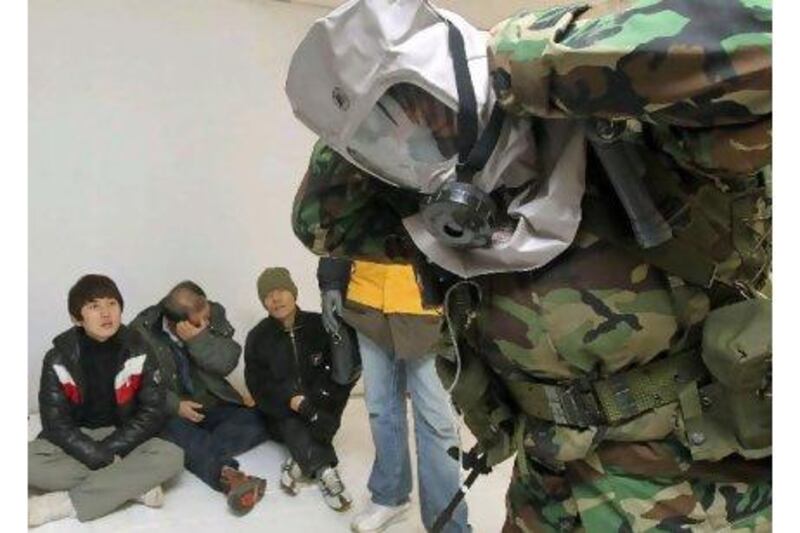BEIJING // South Korea yesterday carried out what analysts described as "a finely calibrated" set of military exercises designed to show it would not back down over provocations from the north, while avoiding an escalation of tensions.
Despite dire warnings from Pyongyang that yesterday's exercises off Yeonpyeong island in the Yellow Sea would be met with force, potentially leading to an all-out conflict, the situation was calm yesterday evening.
The South Korean military fired artillery shells into the sea during the 94-minute exercises, which came less than a month after similar exercises prompted North Korea to shell Yeonpyeong, killing two marines and two civilians.
North Korea branded its southern neighbour's actions "reckless military provocation" but said it had not responded militarily this time because South Korea had aimed its firing farther from its shores.
China and Russia had cautioned South Korea against carrying out the exercises, and yesterday morning in Seoul, protesters also called for the drills to be abandoned amid fears they could spark a conflict.
Reports from South Korea indicated its northern neighbour had readied its own artillery batteries in advance of the exercises.
Lee Bung-woo, a spokesman for the South Korean Joint Chiefs of Staff, was quoted by South Korea's Yonhap news agency as saying his military "did not make any additional provocations" during yesterday afternoon's drills.
Seoul said it fired into its own territorial waters more than 10km from the maritime border, although North Korea claims some areas south of the border are its own.
Fighter jets from South Korea were on standby on the Yellow Sea while the firing took place, following promises by the country's new defence minister, Kim Kwan-jin, that any additional attacks from Pyongyang would be met with air strikes.
The exercises followed an emergency United Nations Security Council meeting late on Sunday that failed to reach agreement on how to respond to the crisis on the peninsula.
China, a permanent member of the Security Council and North Korea's main ally and aid donor, refused to agree to a statement that condemned last month's shelling of Yeonpyeong.
Despite the peninsula appearing to be on a knife edge this week, analysts said an escalation of tensions was unlikely.
"Both sides are playing brinkmanship. Some people will get hurt and killed," said Chung Chienpeng, an associate professor of political science at Lingnan University in Hong Kong.
South Korea's ally the United States and North Korea's ally China would be likely to prevent either side from carrying out actions that could spark a "full-scale war", he added.
"A lot of this cross-border shooting has happened through the years," he said.
Yesterday's drills had to go ahead because the South Korean president, Lee Myung-bak, could not be seen to be weak in the face of North Korean aggression, said Alan Chong, an associate professor in the S Rajaratnam School of International Studies at Singapore's Nanyang Technological University.
Nevertheless, Mr Chong said South Korea's action "has been finely calibrated" to avoid sparking a reaction from Pyongyang, with the firing being aimed away from North Korea.
"The South Korean military has been careful," he said.
Also yesterday, the governor of New Mexico and a former US ambassador to the United Nations, Bill Richardson, currently visiting Pyongyang, was reported to have secured North Korea's agreement for the return of International Atomic Energy Agency inspectors, more than a year and a half after they had left.
According to the CNN journalist Wolf Blitzer, travelling with Mr Richardson, the communist regime also said it would "negotiate the sale of 12,000 fresh fuel rods and ship them to an outside country".
The presence of Mr Richardson in North Korea was another reason why an attack from Pyongyang in response to yesterday's exercises was unlikely, Mr Chong added.






